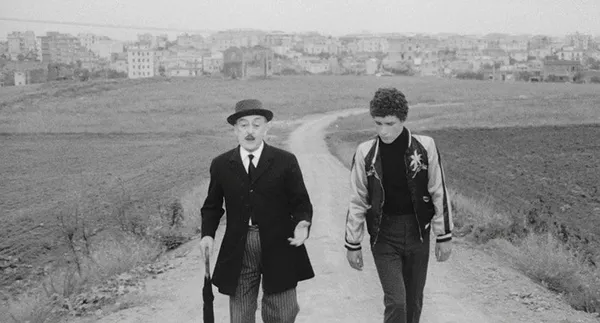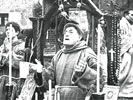Eye For Film >> Movies >> Hawks And Sparrows (1966) Film Review
Hawks And Sparrows
Reviewed by: Ben Sillis

It’s not often that a film opens with the credits being sung, and even less common for the same singer to declare that the director put his reputation on the line in the making of the film. Normally this would seem like self-indulgence in the extreme, but watching Hawks And Sparrows, it’s not hard to see why. Italian director Pier Paolo Pasolini’s film breaks structural and thematic conventions like few others, and stands as one of the most remarkable political films of that most turbulent of decades, the 1960s.
The premise sounds simple. A father and son are walking through the empty roads of Italy, though to what destination we are never told. Through the people they meet and the stories they hear, Pasolini looks at everything from imperialism (The Las Vegas themed Café they visit) to religion, poverty, demography, the problems of the political Right and Left, and social divisions. The twist: accompanying the men on their travels is, er, a talking crow, who also happens to be a leftwing intellectual. As you do.

Despite the use of non-professional actors, save for the famous Toto as the father, in most parts then, it’s a road trip that takes a serious look at Italy’s socio-economic plight without being Neorealist (Fellini’s La Strada made the same fantastical break, but in a more light-hearted manner). Indeed, it avoids pigeonholing as a road movie too. One half-hour segment focuses on a pair of medieval Italian monks (played by the leads) ordered to spread the word of God to the hawks and sparrows, species Pasolini uses as a metaphor for class conflict, the haves and have-nots.
Underlining his point is the mixture of poverty and wealth that Pasolini’s 1960s “Boom” Italy represented. Any boom was in the North only, and among the already rich, men like the greedy engineer the pair owe money to. Cinematographers Mario Bernardo and Tonino Delli Colli vividly depict these divisions, from the hordes of silent unemployed, to the newly surfaced but empty highways and commercial airliners flying overhead.
Pasolini was a talented artist, with an unusual world view; a staunch anti-Vatican who made a film in conjunction with the Catholic Church, The Gospel According To St Matthew, and Hawks was made at a unique and charged point in Italy, shortly after the assassination of socialist leader Palmiro Togliatti in 1964 (whose funeral is fictionalised in the film). If he argues anything here, it seems to be that, in theory at least, communism can be an extension of Christian moral codes. This has been bastardised, he hints at, by Maoism, rural-based communism that the Chinese leader pioneered: “The Chinese, the Chinese!”, cries a starving woman in the film who boils bird nests for sustenance, at a time when the impact of his Great Leap Forward was beginning to emerge in the West. The funerals and cremations that punctuate the film convey Pasolini’s belief that only the Chairman has caused the death of a virtuous communism.
Refreshingly, Pasolini drops some of his more bizarre obsessions for the film. Decapitation and severed heads feature in no less than three of his works, but are thankfully absent here. Somewhat inevitably though, given that the film is only 90 minutes, Hawks suffers by trying to say too much in too short a time, and the segments sometimes feel disconnected or even somewhat repetitive. But more than any other of his films, it feels personal (He later called it his favourite work). With Hawks, a frustrated and passionate Pasolini was trying to reach out and speak to both sides of the divide titling the film, but without knowing where to begin.
Reviewed on: 04 Aug 2007


















